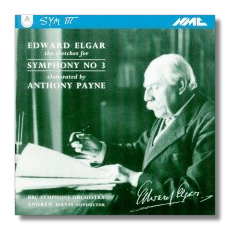
The Internet's Premier Classical Music Source
Related Links
- Elgar Reviews
- Latest Reviews
- More Reviews
-
By Composer
-
Collections
DVD & Blu-ray
Books
Concert Reviews
Articles/Interviews
Software
Audio
Search Amazon
Recommended Links
Site News
 CD Review
CD Review
Edward Elgar

Symphony #3
Completed by Anthony Payne
BBC Symphony Orchestra/Andrew Davis
NMC D053 DDD 56:10
This is the first recording of the greatest symphony Edward Elgar never quite wrote.
Shortly before his death in 1934, Elgar told a friend to burn the sketches – "all bits and pieces" – of what was to have been his Third Symphony. "No one would understand," he continued. If this truly was the composer's wish, it was not realized, and there has been on again, off again interest in these sketches (which account for well over a hundred pages of manuscript paper) in the decades since Elgar's death.
Composer Anthony Payne had been interested in these manuscripts for more than 20 years when the BBC asked him, in 1993, to attempt putting them together for a workshop performance. (In fact, this was a false start, but Elgar's family, recognizing that the published sketches would be out of copyright in 2005, eventually felt that Payne was by far the least of many evils.) Payne's guide was W.H. Reed's book Elgar as I Knew Him, which includes many (but not all) of the sketches, and recounts the many hours that Reed and Elgar spent together discussing and playing through them. In the case of the Scherzo, Reed is very helpful, and this was the first movement that Payne completed. In other cases, however, Payne has had to rely upon his own intuition and knowledge of Elgar music.
Conventional wisdom states that Elgar's inspiration waned greatly after the death of his wife in 1920. Given what we have here, I'm afraid that we don't have enough information either to confirm or deny it. There is a lot about this symphony that is striking – some of it in a typically Elgarian way, and some atypically. (But why should this symphony sound like either of its predecessors?) At least after my few hearings, the symphony also seems tentative and half-baked; it is missing the self-confidence that defines the composer's mature style. The Scherzo probably is the most successful movement, but it looks back at Elgar's salon music, not forward at the light or the abyss. It was Payne's decision to end the symphony quietly, with an allusion to music Elgar had written for the Nursery Suite. It's the most un-Elgarian aspect of the entire work.
Make no mistake: this is an interesting project, and this recording is essential for everyone with more than a passing interest in Elgar. However, Payne and Elgar deserve equal credit for the work; even Mahler's Tenth Symphony was a much more complete work at the time of the composer's death, and look how the reconstructions of that work differ from one version to the next. Payne is not a mind-reader, and neither is he, I believe, a composer in Elgar's rank. Still, he deserves recognition for his daring, if not precisely for his achievement.
The performance and sound are serviceable, but one feels that both could have been more helpful.
Copyright © 1999, Raymond Tuttle


















